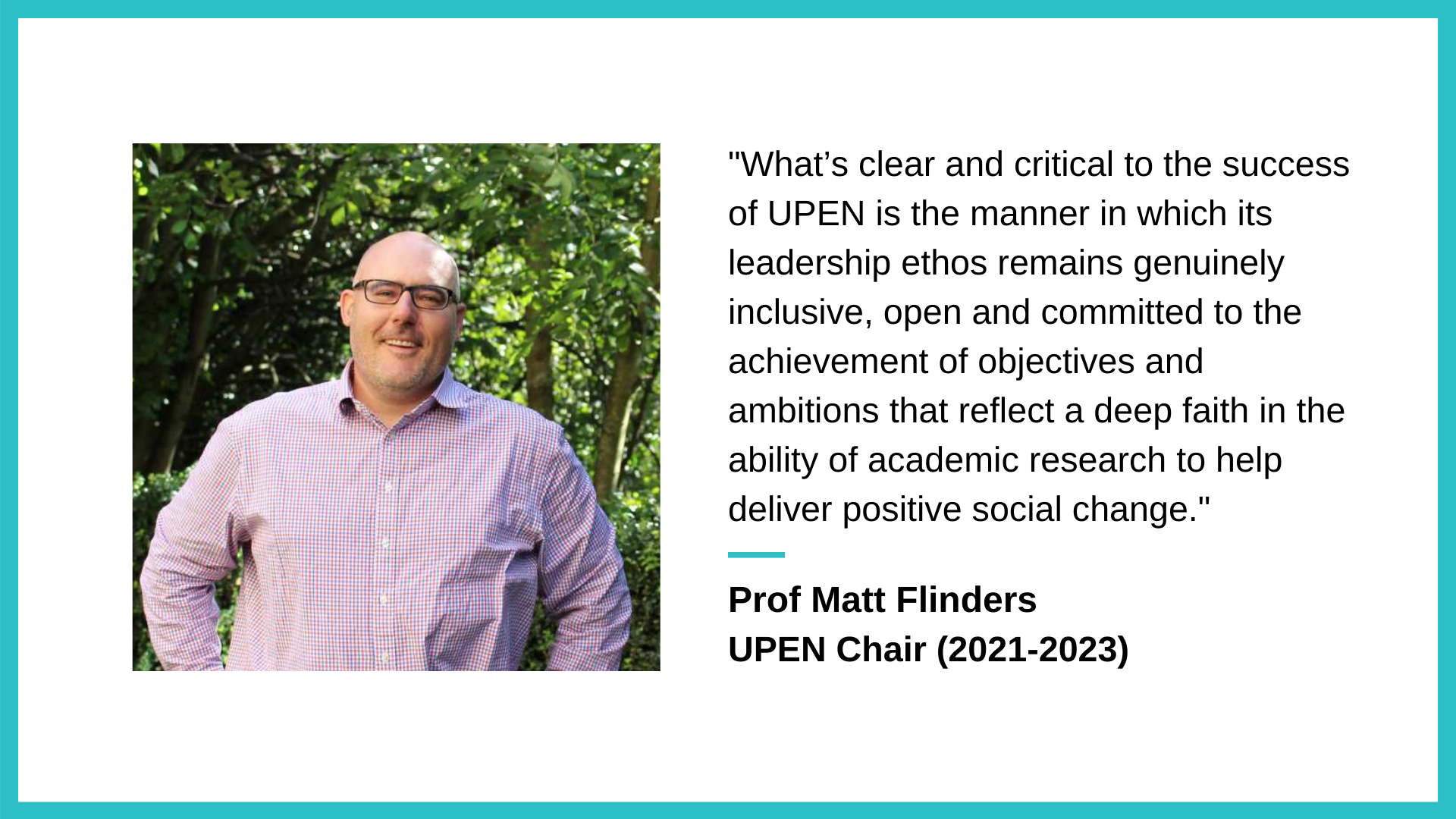University Policy Engagement: Looking forward to 2021 (and beyond)
Posted 2020-12-07 10:36:05 by Prof Matt Flinders, UPEN Chair 2021-2023

UPEN's upcoming Chair (2021-2023) reflects on the role of UPEN and it's priorities going forward.
There’s little doubt that 2020 was, from a number of perspectives, an incredibly challenging year. No one expected the trials of the Brexit transition process to be overlaid with a Covid-related global pandemic. And yet within this tumultuous period the importance of university policy engagement, in general, and the role of UPEN, in particular, really did come to the fore as policy makers attempted to utilise the very best research and evidence. Right across the scientific spectrum university policy engagement took on an added significance and visibility.
The breadth and depth of the engagement achievements set out in UPEN’s recent ‘Impact Report’ is testament to this argument with frequent events, numerous submissions to government and parliamentary commissions and strategic relationships established with sixteen Whitehall departments. The role that UPEN has played in supporting the ‘Areas of Research Interest’ has been critical to the evolution of that innovation and lots of conversations and projects are ongoing with key partners, such as the Parliamentary Office of Science and Technology and the Government Office for Science. A key symbol of success has been the growth of UPEN’s membership which now includes over seventy universities.
There is something about the ‘acorns into oaks trees’ adage about UPEN. It has grown and matured into arguably the main policy platform at the interface of higher education and professional public policy in the United Kingdom. Seen from this arboreal metaphor, Gavin Costigan, Thea Kouraki, Stephen Meek and Kayleigh Renberg Fawcett deserve huge credit for nurturing and leading the organisation through its early phases of development. And yet what’s clear and critical to the success of UPEN is the manner in which its leadership ethos remains genuinely inclusive, open and committed to the achievement of objectives and ambitions that reflect a deep faith in the ability of academic research to help deliver positive social change.
Looking to the future, one of the few statements that can be made with any certainty is that the UK is entering a period of ‘beyond Brexit’ uncertainty and, as a result, the role, importance and potential contribution of university policy engagement has never been greater. From working with local, regional and national government, as well as charities, international organisations and governments, through to facilitating the mobility of people, ideas and talent across traditional institutional, disciplinary and organisational boundaries – whether the UK flounders or flourishes will to some extent depend on its ability to harness world-class research within dynamic policy-making structures.
This is exactly why the role and position of UPEN at the intersection or nexus between the worlds of research and public policy is so important and so exciting.
Looking forward to 2021 and beyond, the opportunities for UPEN to play a positive role in supporting knowledge utilisation in the academic-policy engagement space are great. This includes positioning ourselves more visibly as a route to expertise for policy stakeholders, utilising our collective voice to improve mechanisms of engagement, and to better profile and support the knowledge exchange mobilisers who are operating in this nexus. At the heart of all this is UPEN’s mission to make engagement between policy and research more democratic and more diverse. Operating in the wider context, there are also opportunities for UPEN to contribute to the government’s thinking about the UK’s R&D ‘roadmap’, supporting UKRI’s thinking around research culture and talent management, working with institutions and partners to develop new training opportunities, engage with key actors in this space such as CAPE, feed into the post-2021 review of the Research Excellence Framework and (critically) help to raise ambitions in relation to equality, diversity and inclusion within the university ecosystem. More specific priorities for UPEN include building organisational capacity, developing strategic priorities and exploring new income streams.
When I stood for election to be the next chair of UPEN (2021-2023) I suggested that my approach would be to emphasise ambition, visibility and diversity. The more I have learnt about the organisation and the more I have thought about 2021 and beyond the more certain I am that these three principles provide a strong foundation for thinking about UPEN’s development. How these principles translate into action, however, is something that I will look to members to help clarify and inform. But for now and particularly after such a busy and challenging year, please let me take this opportunity to simply wish everyone within (and beyond) UPEN a very peaceful and restful festive break.
Matthew Flinders is Founding Director of the Sir Bernard Crick Centre and Professor of Politics at the University of Sheffield. He is also Vice-President of the Political Studies Association of the United Kingdom. Matt will become Chair of UPEN on the 1 February, 2021.










































































































